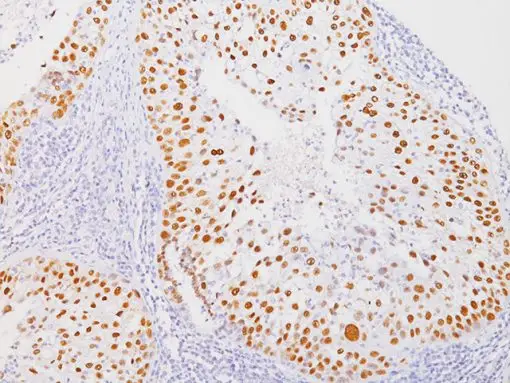Description
The SOX2 gene encodes a member of the SRY-related HMG-box (SOX) family of transcription factors. SOX2 is expressed in multipotent neuronal stem cells, and may aid to identify cells that are capable of self-renewal and multipotent differentiation (1-3). SOX2 has been shown to be a negative prognostic factor and associated with aggressive phenotypes in breast, head and neck, gastric, colorectal and bladder cancers (4-10). In small cell lung cancers, SOX2 was also correlated with a poor prognosis. Conversely, SOX2 is expressed in a high percentage of lung squamous cell carcinomas and was shown to be an independent positive prognostic marker (11-14).
SPECIFICATIONS
Specifications
| INTENDED USE | IVD |
|---|---|
| FORMAT | Concentrate, Predilute |
| VOLUME | 0.1 ml, 1.0 ml, 6.0 ml |
| SOURCE | Mouse Monoclonal |
| CLONE | BC36, Biocare Clone |
| ISOTYPE | IgG1/kappa |
| ANTIGEN | SOX2 |
| LOCALIZATION | Nuclear |
| POSITIVE CONTROL | Lung squamous cell carcinoma |
DATASHEETS & SDS
REFERENCES
1. Gene: http://www.ncbi.nlm.nih.gov/gene/6657
2. Graham V, et al. SOX2 functions to maintain neural progenitor identity. Neuron. 2003 Aug 28; 39(5):749-65.
3. Ellis P, et al. SOX2, a persistent marker for multipotential neural stem cells derived from embryonic stem cells, the embryo or the adult. Dev Neurosci. 2004 Mar-Aug; 26 (2-4):148-65.
4. Rodriguez-Pinilla SM, et al. Sox2: a possible driver of the basal-like phenotype in sporadic breast cancer. Mod Pathol. 2007 Apr; 20(4):474-81.
5. Huang YH, et al. Increased SOX2 expression in less differentiated breast carcinomas and their lymph node metastases. Histopathology. 2014 Mar; 64(4):494-503.
6. Li W, et al. SOX2 as prognostic factor in head and neck cancer: a systematic review and meta-analysis. Acta Otolaryngol. 2014 Nov; 134(11):1101-8.
7. Camilo V, et al. Immunohistochemical molecular phenotypes of gastric cancer based on SOX2 and CDX2 predict patient outcome. BMC Cancer. 2014 Oct 9; 14:753.
8. Lundberg IV, et al. SOX2 expression is regulated by BRAF and contributes to poor patient prognosis in colorectal cancer. PLoS One. 2014 Jul 10; 9(7):e101957.
9. Saigusa S, et al. Correlation of CD133, OCT4, and SOX2 in rectal cancer and their association with distant recurrence after chemoradiotherapy. Ann Surg Oncol. 2009 Dec; 16(12):3488-98.
10. Ruan J, et al. Predictive value of Sox2 expression in transurethral resection specimens in patients with T1 bladder cancer. Med Oncol. 2013 Mar; 30(1):445.
11. Velcheti V, et al. High SOX2 levels predict better outcome in non-small cell lung carcinomas. PLoS One. 2013 Apr 19; 8(4):e61427.
12. Wilbertz T, et al. SOX2 gene amplification and protein overexpression are associated with better outcome in squamous cell lung cancer. Mod Pathol. 2011 Jul; 24 (7):944-53.
13. Li X, et al. Expression of sox2 and oct4 and their clinical significance in human non-small-cell lung cancer. Int J Mol Sci. 2012; 13(6):7663-75.
14. Yang F, et al. Elevated expression of SOX2 and FGFR1 in correlation with poor prognosis in patients with small cell lung cancer. Int J Clin Exp Pathol. 2013 Nov 15; 6 (12):2846-54.
15. Center for Disease Control Manual. Guide: Safety Management, NO. CDC-22, Atlanta, GA. April 30, 1976 “Decontamination of Laboratory Sink Drains to Remove Azide Salts.”
16. Clinical and Laboratory Standards Institute (CLSI). Protection of Laboratory Workers from Occupationally Acquired Infections; Approved Guideline-Fourth Edition CLSI document M29-A4 Wayne, PA 2014.







Reviews
There are no reviews yet.